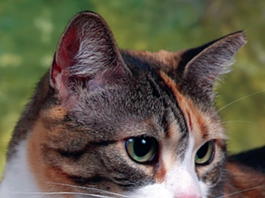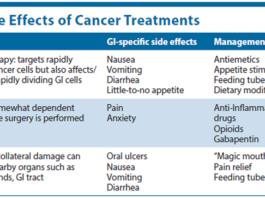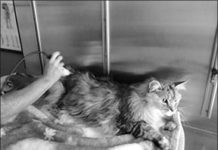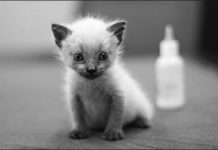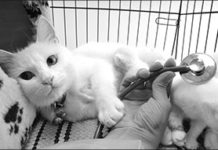Welcome Mat for Pets
A growing number of hospitals around the country are prescribing what they call “pet medicine” to boost patients’ spirits. They’re allowing family cats and dogs to visit. North Shore University Hospital and the Hospice Inn, both on Long Island, even let pets stay with patients around the clock.
Cold Laser Therapy Gains Acceptance
Don’t be surprised if your cat’s veterinarian dons special dark goggles in the exam room and applies a handheld wand to targeted areas on your cat’s body to speed up healing from surgery or ease the pain of arthritis. The latest tool in pain management — called cold laser therapy — is quickly gaining acceptance from veterinarians in teaching hospitals and small animal practices across the country.
New Rules for CPR Save More Lives
For years, pet owners were instructed to first check for a pulse before using cardiopulmonary resuscitation to revive a cat. Now, however, new guidelines from emergency care veterinarians advise that if you find your cat unresponsive and motionless, immediately start chest compressions. The reason: This protocol simply saves more lives.
The Coat Tells the Tale: Illness or Allergy
All cats shed, but some cases become extreme to the point of baldness. If you’ve ever wondered if your cat needs a toupee, you’re not alone. Hair loss, or alopecia, is common in cats. It is, however, a symptom of an underlying disorder, rather than a disorder itself, says dermatologist William H. Miller, VMD, Medical Director of the Cornell University Companion Animal Hospital. “In order to solve the alopecia, we need to determine the cause of the problem,” Dr. Miller says.
Finicky Eaters? They’re Born That Way
Veterinary nutritionist Joseph J. Wakshlag, DVM, Ph.D., has an eye-opening assessment about finicky eaters: “The reality is that most finicky cats are the best kinds to have because they regulate themselves. They eat to meet a requirement to keep themselves alive, not for pleasure. They are lean animals and usually live longer.
Holiday Hazards Can Tempt the Curious
As then-veterinary student Pamela J. Perry, DVM, Ph.D., was packing her car to head home for the holidays, her cat Chester began vomiting wads of tinsel. When she called the veterinary college to have Chester examined, her roommate mentioned that she had seen Chester pulling strands of tinsel from the tree and eating them — she even took photographs.
Finicky Eaters? Theyre Born That Way
Veterinary nutritionist Joseph J. Wakshlag, DVM, Ph.D., has an eye-opening assessment about finicky eaters: “The reality is that most finicky cats are the best kinds to have because they regulate themselves. They eat to meet a requirement to keep themselves alive, not for pleasure. They are lean animals and usually live longer.
A Second Chance for Newborn Kittens
Volunteers at an animal adoption center in Los Angeles are keeping kittens alive with one simple act of kindness. They’re feeding newborns in two-hour shifts around the clock. They view their effort as crucial: Among 13,000 healthy or treatable pets euthanized at Los Angeles City shelters last year, more than 6,000 were neonatal — or newborn — kittens.
What to Expect Pre- and Post-Surgery
Chances are that your cat will face a surgical procedure at least once during his lifetime if he hasn’t already. Happily, the nature of veterinary surgery is changing, which may mean that your cat’s next encounter could differ considerably.
WHY DO THEY… (Almost) Always Land on Their Feet?
You cringe as your acrobatic cat maneuvers through an open window and accidentally falls or jumps to freedom in the great outdoors, landing feet first. While it seems as if cats almost always land on their feet, the truth is that they don’t always land safely. Internal injuries can occur and owners can sometimes overlook them.
How to Avoid Those Sharp Feline Bites
Cat bites don’t get as much media coverage — or as much scientific attention — as dog bites because they tend to occur inside the home. Moreover, people mistakenly assume that, because cats are small, they can’t do much damage. In fact, puncture wounds made by sharp feline teeth are not only painful, they can lead to serious infections. It’s important to learn how to avoid them. Although cats sometimes appear to attack out of the blue, they always have their reasons, says Katherine A. Houpt, VMD, Ph.D., emeritus professor at the Cornell University College of Veterinary Medicine and diplomate of the American College of Veterinary Behaviorists. “Fear, predatory aggression, and pain top the list.
WHY DO THEY (Almost) Always Land on Their Feet?
You cringe as your acrobatic cat maneuvers through an open window and accidentally falls or jumps to freedom in the great outdoors, landing feet first. While it seems as if cats almost always land on their feet, the truth is that they don’t always land safely. Internal injuries can occur and owners can sometimes overlook them.



